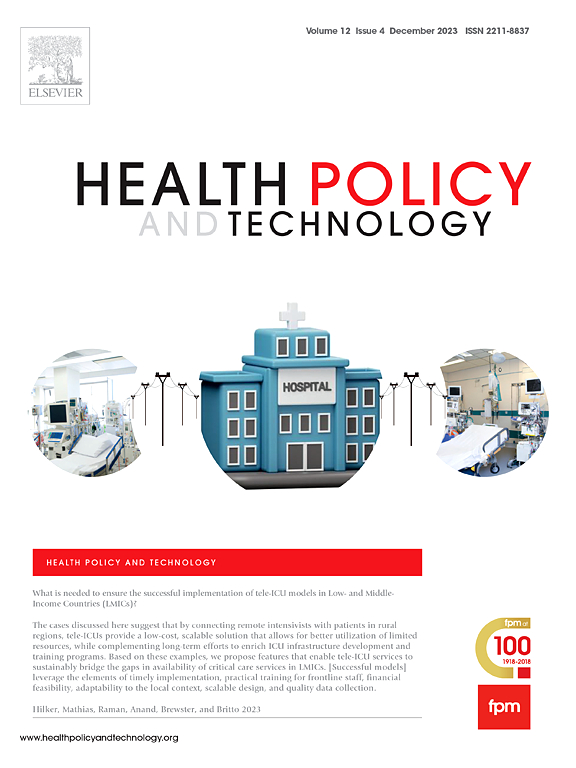评估欧洲 HTA 法规的实施进展:欧洲准入学院多方利益相关者调查的启示
IF 3.4
3区 医学
Q1 HEALTH POLICY & SERVICES
引用次数: 0
摘要
目标我们开展了一项多方利益相关者调查,以评估利益相关者对《欧洲卫生技术评估条例》(EU HTA R)实施进展的看法,并确定实施过程中仍面临的挑战和优先次序。方法通过两个迭代德尔菲周期,我们制定了一项探索性半定量调查,以确定利益相关者如何:1)体验该条例的准备活动;2)确定成功实施过程中仍面临的挑战的优先次序。调查表在欧洲准入学院网络中分发,并通过社交媒体进行传播,以确保覆盖主要利益相关者。对定量回答项目进行了描述性分析,对排序项目计算了相对重要性。结果共收到来自 15 个国家的 61 份回复,其中包括全球/欧盟范围内的机构(患者和患者代表:7 份;临床医生代表:1 份):患者和患者代表:7;临床医生代表:5;监管机构:55;监管机构3; 卫生技术开发人员 (HTDs):20;HTA 机构:10;付款人:7;决策者:2;学术代表:7):7).大多数受访者了解筹备活动,74%(N = 45)的受访者注意到指导文件的起草,64%(N = 39)的受访者注意到协调小组的成立。受访者对筹备活动成功与否的评价为中性,略倾向于正面。主要挑战是成员国对联合临床评估的准备程度、HTA 能力/能力限制以及方法框架的适用性/可行性。主要结论强调,国家系统和程序的准备程度是关键因素。要充分发挥联合 HTA 流程的潜力,并在泛欧范围内提高患者对创新技术的可及性,就必须在运营效率与战略目标(包括制定欧洲价值框架)之间取得平衡。条例中规定的联合程序旨在通过协调 HTA 实践和促进各成员国之间的合作,提高资源的使用效率,并确保全欧盟范围内 HTA 合作的长期可持续性。在 2023 年年中准备阶段即将过半之际,我们进行了一次多方利益相关者调查,以评估对实施联合程序所取得进展的看法,并对剩余挑战进行优先排序。调查结果显示,受访者对筹备活动(即建立协调小组和利益相关方网络,以及编制指导文件)的看法从中立到积极。受访者优先考虑的挑战涉及会员国的准备程度、HTA 能力的局限性以及评估方法的适用性。需要开展进一步研究,为特定利益相关者群体确定有针对性的战略,以有效应对已确定的挑战。本文章由计算机程序翻译,如有差异,请以英文原文为准。
Evaluating progress towards implementation of the European HTA Regulation: Insights generated from the European Access Academy's multi-stakeholder survey
Objectives
We conducted a multi-stakeholder survey to assess stakeholders' perceptions of the progress made towards the implementation of the European Regulation on Health Technology Assessment (EU HTA R) and to identify and prioritize the remaining challenges for implementation.
Methods
Using two iterative Delphi cycles, an exploratory, semi-quantitative survey was developed to identify how stakeholders 1) experienced preparatory activities of the Regulation, and 2) prioritized remaining challenges for successful implementation. The survey was distributed among the network of the European Access Academy and via social media to ensure coverage of key stakeholders. Descriptive analyses were performed on quantitative response items, and relative importance was calculated for ranking items. Free-text responses supplemented participants' answers to quantitative questions.
Results
N = 61 responses were received from N = 15 countries including Global/ EU-wide institutions (Patients and Patients’ representatives: 7; Clinicians’ representatives: 5; Regulators: 3; Health Technology Developers (HTDs): 20; HTA bodies: 10; Payers: 7; Policy Makers: 2; Academic representatives: 7). The majority of respondents were aware of preparatory activities, with 74 % (N = 45) observing the drafting of Guidance Documents and 64 % (N = 39) noting the establishment of the Coordination Group. Respondents ranked the success of preparatory activities neutral with a slight tendency towards a positive ranking. Key challenges were Member States' readiness for Joint Clinical Assessments, HTA capacity/ capability constraints, and the applicability/ feasibility of the methodological framework.
Conclusions
This study identified the key remaining challenges for the successful establishment of the EU HTA process. Key findings emphasize the readiness of national systems and procedures as pivotal factors. Balancing operational efficiency with strategic objectives, including the development of a European Value Framework, is imperative for harnessing the full potential of the joint HTA process and enhancing patient access to innovative technologies on a pan-European scale.
Public interest summary
In January 2022, the European Union (EU) adopted the European Regulation on Health Technology Assessment (HTA). By harmonizing HTA practices and promoting collaboration across Member States, the joint procedure as set out in the regulation aims to improve efficient use of resources and ensure long-term sustainability of EU-wide HTA cooperation. Close to reaching the half-way mark of the preparation phase in mid-2023, we conducted a multi-stakeholder survey to assess perceptions of the progress made towards implementation of a joint procedure and to prioritize remaining challenges. The responses indicated a neutral to positive perception of the preparatory activities (i.e., establishing a coordination group and a stakeholder network, and creating guidance documents). Respondents prioritized challenges related to the readiness of Member States, limitations in HTA capacity and capability, and applicability of the assessment methods. Further research is needed to define targeted strategies for specific stakeholder groups to effectively address the identified challenges.
求助全文
通过发布文献求助,成功后即可免费获取论文全文。
去求助
来源期刊

Health Policy and Technology
Medicine-Health Policy
CiteScore
9.20
自引率
3.30%
发文量
78
审稿时长
88 days
期刊介绍:
Health Policy and Technology (HPT), is the official journal of the Fellowship of Postgraduate Medicine (FPM), a cross-disciplinary journal, which focuses on past, present and future health policy and the role of technology in clinical and non-clinical national and international health environments.
HPT provides a further excellent way for the FPM to continue to make important national and international contributions to development of policy and practice within medicine and related disciplines. The aim of HPT is to publish relevant, timely and accessible articles and commentaries to support policy-makers, health professionals, health technology providers, patient groups and academia interested in health policy and technology.
Topics covered by HPT will include:
- Health technology, including drug discovery, diagnostics, medicines, devices, therapeutic delivery and eHealth systems
- Cross-national comparisons on health policy using evidence-based approaches
- National studies on health policy to determine the outcomes of technology-driven initiatives
- Cross-border eHealth including health tourism
- The digital divide in mobility, access and affordability of healthcare
- Health technology assessment (HTA) methods and tools for evaluating the effectiveness of clinical and non-clinical health technologies
- Health and eHealth indicators and benchmarks (measure/metrics) for understanding the adoption and diffusion of health technologies
- Health and eHealth models and frameworks to support policy-makers and other stakeholders in decision-making
- Stakeholder engagement with health technologies (clinical and patient/citizen buy-in)
- Regulation and health economics
 求助内容:
求助内容: 应助结果提醒方式:
应助结果提醒方式:


